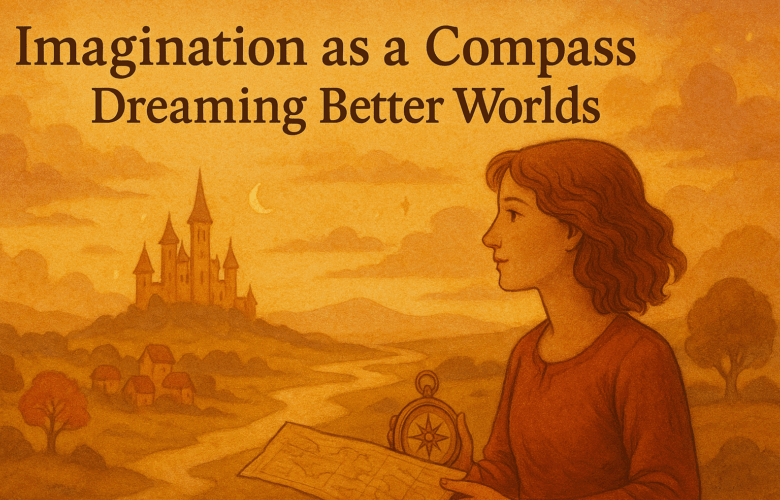How envisioning fantasy worlds helps us build real ones aligned with love and justice
Introduction: The Map We Haven’t Drawn Yet
Every step forward in human history began in someone’s imagination. Before democracy was established, it had to be dreamed. Before civil rights were fought for, someone had to envision a world where dignity was possible for everyone. Imagination is not an escape from reality—it is the compass that points toward what reality could become.
When we allow ourselves to dream, to play, to tell stories of worlds where kindness rules and justice flows like water, we are sketching the outlines of futures worth pursuing. Fantasy and myth aren’t childish indulgences; they are training grounds for our moral vision.
Why Imagination Matters for Justice
Imagination is the rehearsal space for empathy. When we picture ourselves in another’s shoes—or invent characters and worlds that embody different lives—we practice compassion in ways logic alone cannot achieve.
Justice requires more than policy; it requires heart. And hearts are reshaped not by statistics, but by stories. Think of how novels, films, and fairy tales have shifted cultural conversations: dystopias warning us where cruelty leads, utopias beckoning us toward possibility, allegories opening our eyes to hidden truths.
Without imagination, justice stagnates into mere rule-following. With imagination, it blooms into love made visible.
Fantasy as a Laboratory for Ethics
Fantasy worlds allow us to test ideas without real-world consequences. What would a society look like without prisons? Without money? Without rigid gender categories? When we build these worlds in stories, we see both the beauty and the challenges—and we carry those insights back with us.
Consider how speculative fiction has stretched our collective moral muscles:
- Ursula K. Le Guin’s The Dispossessed dared us to imagine anarchist societies rooted in cooperation.
- Octavia Butler’s Parable series illuminated resilience, adaptation, and community-building amid collapse.
- Countless indigenous myths remind us of interdependence with the earth, long before environmental crises demanded our attention.
By exploring these imagined landscapes, we train ourselves to think differently about our own.
The Risk of Shrinking Our Dreams
One of the greatest dangers we face today is not too much fantasy, but too little. Cynicism convinces us that “the world just is the way it is.” Despair whispers that nothing can change. When our dreams shrink, so does our courage.
This is why oppressive systems work hard to control imagination. They mock utopias, belittle visionaries, and insist that “realism” means staying within the lines they’ve drawn. But realism without imagination only preserves the injustices of the present.
To resist oppression, we must reclaim the right to dream boldly.
Imagination Rooted in Love
Of course, imagination can be twisted. History shows us fantasies of domination, supremacy, and exclusion. These are nightmares dressed as dreams.
The compass we need must be calibrated by love. Not sentimental love, but the fierce, justice-making love that insists on every person’s dignity. When we dream from that place, our stories guide us toward freedom, not away from it.
Sacred Play: Practicing Tomorrow Today
When we play—whether through storytelling, art, role-play, or simply daydreaming—we are practicing futures. This is sacred work. To gather with friends and imagine a world without shame, or to craft tales of communities that thrive in cooperation, is to participate in prophecy.
Every small act of creative play says: another way is possible. And the more vividly we imagine it, the more possible it becomes.
Bringing the Dream Down to Earth
How can we use imagination as a compass in daily life? A few practices:
- Vision journaling: Write about the world you long for, in detail. Let it be wild, generous, and bold.
- Story exchange: Share imaginative stories with friends or communities that reflect the justice you crave.
- Embodied rehearsal: Try living a small piece of the dream now—practice the compassion, equity, or freedom you’ve envisioned, even if the world isn’t ready.
- Cultural consumption: Read, watch, and listen to stories that expand your vision of justice. Let them fertilize your imagination.
Conclusion: Dreaming as Resistance
To dream is not to flee from reality—it is to refuse its unjust limits. Imagination is resistance, and storytelling is survival. When we dare to dream better worlds, we plant seeds of the future in the soil of today.
The question is not whether we dream, but which dreams we choose to follow. If we let love and justice guide us, imagination becomes more than fantasy. It becomes our compass home.
Sacred Play is not about leaving the world behind. It’s about daring to imagine worlds where love is real, justice is natural, and every life is treated as sacred—and then walking toward them, step by step.


